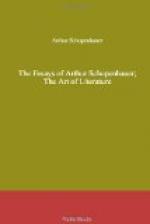All branches of learning have thus been so much enlarged that he who would “do something” has to pursue no more than one subject and disregard all others. In his own subject he will then, it is true, be superior to the vulgar; but in all else he will belong to it. If we add to this that neglect of the ancient languages, which is now-a-days on the increase and is doing away with all general education in the humanities—for a mere smattering of Latin and Greek is of no use—we shall come to have men of learning who outside their own subject display an ignorance truly bovine.
An exclusive specialist of this kind stands on a par with a workman in a factory, whose whole life is spent in making one particular kind of screw, or catch, or handle, for some particular instrument or machine, in which, indeed, he attains incredible dexterity. The specialist may also be likened to a man who lives in his own house and never leaves it. There he is perfectly familiar with everything, every little step, corner, or board; much as Quasimodo in Victor Hugo’s Notre Dame knows the cathedral; but outside it, all is strange and unknown.
For true culture in the humanities it is absolutely necessary that a man should be many-sided and take large views; and for a man of learning in the higher sense of the word, an extensive acquaintance with history is needful. He, however, who wishes to be a complete philosopher, must gather into his head the remotest ends of human knowledge: for where else could they ever come together?
It is precisely minds of the first order that will never be specialists. For their very nature is to make the whole of existence their problem; and this is a subject upon which they will every one of them in some form provide mankind with a new revelation. For he alone can deserve the name of genius who takes the All, the Essential, the Universal, for the theme of his achievements; not he who spends his life in explaining some special relation of things one to another.
ON THINKING FOR ONESELF.
A library may be very large; but if it is in disorder, it is not so useful as one that is small but well arranged. In the same way, a man may have a great mass of knowledge, but if he has not worked it up by thinking it over for himself, it has much less value than a far smaller amount which he has thoroughly pondered. For it is only when a man looks at his knowledge from all sides, and combines the things he knows by comparing truth with truth, that he obtains a complete hold over it and gets it into his power. A man cannot turn over anything in his mind unless he knows it; he should, therefore, learn something; but it is only when he has turned it over that he can be said to know it.
Reading and learning are things that anyone can do of his own free will; but not so thinking. Thinking must be kindled, like a fire by a draught; it must be sustained by some interest in the matter in hand. This interest may be of purely objective kind, or merely subjective. The latter comes into play only in things that concern us personally. Objective interest is confined to heads that think by nature; to whom thinking is as natural as breathing; and they are very rare. This is why most men of learning show so little of it.




